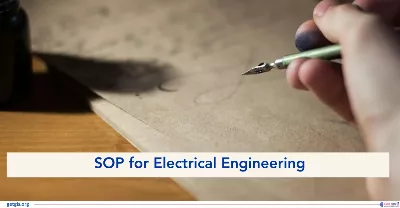SOP for Electrical Engineering for 2026: Guidelines, Format & Free Samples
Updated On
-
Copy link
To write an wining SOP for electrical engineering, you need to reflect on your your passion for innovation. Scroll through and find the format, same, and more of SOP for electrical engineering
Limited-time offer : Access a free 10-Day IELTS study plan curated for you

Table of Contents
- Electrical Engineering SOP Format for 2026
- Statement of Purpose Electrical Engineering Sample
- Guidelines to Follow While Writing SOP for Electrical Engineering
- Expert Tips to Write SOP for Electrical Engineering
- Soft Skills to Highlight in Your SOP for Electrical Engineering
- Dos and Don’ts When Writing SOP for Electrical Engineering
- Write an SOP for Electrical Engineering That No One Can Reject. Take GetGIS Expert Assistance
Writing a winning Electrical Engineering SOP is what will make you stand out in 2026. In a field where GRE scores and strong GPA are the most important criteria, your Statement of Purpose is what will lead you to the top. This document not only highlights your academic achievements and technical expertise but also reflects your passion for innovation in fields like power systems, electronics, and renewable energy. If you are aiming for a research-focused program in the USA or a technical master's in Germany, your electrical engineering Statement of Purpose must do more than list achievements
Your well-drafted SOP could be the difference between securing your dream program and falling short of your aspirations. In this guide, we compiled a collection of expert tips to help you create an SOP for MS in electrical engineering that shines as brightly as a Tesla Coil. Let’s get started.
Electrical Engineering SOP Format for 2026
Your SOP is an opportunity to showcase your personality, passion, and potential as an electrical engineer. By following these guidelines and incorporating these tips, you can craft an SOP that truly electrifies the admissions committee and propels you toward your academic and professional goals.
1. Structure and Length
The SOP for Electrical Engineering should typically follow a structured format and adhere to a recommended length of 700-1000 words. This length allows you to comprehensively convey your academic background, research experiences, and professional aspirations without being overly verbose.
2. Introduction
Begin your SOP with a captivating introduction that grabs the attention of the reader and highlights your passion for electrical engineering. Briefly introduce yourself, your academic background, and your motivations for pursuing a graduate degree in electrical engineering.
3. Academic Background
Delve into your academic journey, detailing your undergraduate or master's degree program, relevant coursework, and any significant academic achievements. Emphasize courses that showcase your aptitude for electrical engineering concepts and your ability to grasp complex theories.
4. Research Experiences
If you have participated in research projects or internships, provide a detailed description of your involvement, highlighting your contributions and the skills you acquired. Showcase your ability to conduct independent research, analyze data, and apply theoretical knowledge to practical problems.
5. Professional Experiences
If you have relevant professional experience, provide a brief overview of your work history, emphasizing your responsibilities, accomplishments, and the skills you developed. Demonstrate how your professional experiences have prepared you for further studies in electrical engineering.
6. Career Aspirations
Articulate your long-term career goals in the field of electrical engineering. Clearly define your area of specialization and how you envision applying your knowledge and skills to make a meaningful impact. Demonstrate your alignment with the program's objectives and your potential to contribute to the field.
7. Conclusion
Reiterate your enthusiasm for the program and your confidence in your ability to succeed. Thank the admissions committee for their time and consideration.
Statement of Purpose Electrical Engineering Sample
To guide you through the process, we've curated some SOP Samples for the Electrical Engineering Course that exemplify effective storytelling and demonstrate key elements admissions committees seek.
Let's delve into this insightful sample from our experts.
From the moment I first witnessed the power of electricity illuminating my childhood home, I was captivated by the transformative nature of electrical engineering. This fascination has propelled me through my academic journey, culminating in my aspiration to pursue a master's in electrical engineering at [university name].
My undergraduate studies in electrical engineering at [university name] provided me with a solid foundation in the fundamentals of electrical circuits, power systems, and control systems. I excelled in courses like Electromagnetic fields, Analog Electronics, and Digital Electronics, demonstrating my strong aptitude for theoretical understanding and practical applications.
My passion for sustainable energy led me to participate in a research project focused on developing a novel energy storage system using nanomaterials. As part of this project, I synthesised nanomaterials, characterised their electrical properties, and constructed prototype energy storage devices. This experience ignited my enthusiasm for renewable energy research and reinforced my desire to contribute to a sustainable future.
Beyond the classroom and research lab, I actively engaged in extracurricular activities related to electrical engineering. I served as a vice president of the IEEE student branch at my university, organising technical workshops, seminars, and industry interactions, fostering a vibrant community of aspiring electrical engineers.
My professional experience as an intern at [company name] further solidified my passion for electrical engineering. I worked on the development of a smart grid system, contributing to the design and implementation of real-time monitoring and control mechanisms. This experience honed my problem-solving skills, teamwork abilities, and ability to translate theoretical knowledge into practical applications.
My ultimate career goal is to become a leading researcher in the field of sustainable energy, developing innovative technologies that will revolutionise our energy landscape. I envision myself contributing to the development of next-generation solar cells, energy-efficient appliances, and intelligent power grids, all while ensuring environmental responsibility and sustainability.
[University name] Master's program in Electrical Engineering, with its emphasis on sustainable energy research and its strong industry connections, aligns perfectly with my academic and professional aspirations. I am particularly drawn to the opportunity to work with Professor [Professor Name], whose expertise in renewable energy technologies aligns with my research interests.
I am confident that my academic background, research experience, and professional skills make me a strong candidate for this program. I am eager to immerse myself in the intellectually stimulating environment at [university name], collaborate with renowned faculty and fellow students, and contribute my knowledge and skills to the advancement of sustainable energy technologies.
Also Read: Statement of Purpose (SOP) for Masters
Guidelines to Follow While Writing SOP for Electrical Engineering
We now know that crafting an outstanding SOP is crucial to showcasing your passion, skills, and aspirations. So, here are essential guidelines and tips to follow while writing an SOP for Electrical Engineering.
- Start Strong: Begin your SOP with a captivating introduction that conveys your genuine interest in electrical engineering. Engage the reader from the outset.
- Highlight Academic Achievements: Showcase your academic excellence, relevant coursework, and any outstanding achievements. Admissions committees seek students with a strong academic foundation.
- Emphasize Professional Experience: If applicable, detail any industry experience, internships, or projects related to electrical engineering. Discuss your role and the skills gained during these experiences.
- Define Research Interests: Clearly outline your specific research interests within electrical engineering. Mention any relevant projects, publications, or innovations that demonstrate your commitment to the field.
- Articulate Career Goals: Clearly state your short-term and long-term career objectives. Explain how obtaining a degree in electrical engineering aligns with your professional aspirations.
- Connect with the Program: Explain why you've chosen this particular program. Discuss the unique features, faculty expertise, or research opportunities that attracted you, showcasing your understanding of the program.
- Highlight Unique Attributes: Identify and emphasize your unique qualities, skills, or experiences that make you stand out. Admissions committees appreciate candidates with distinctive attributes.
- Maintain Clarity and Conciseness: Keep your SOP clear, concise, and focused. Avoid unnecessary details and ensure that every sentence contributes to the overall narrative.
- Proofread Thoroughly: Eliminate grammatical errors and ensure flawless language. A well-proofread SOP reflects your commitment to quality and attention to detail.
- Seek Feedback: Before finalizing your SOP, seek feedback from professors, mentors, or colleagues. Constructive criticism can enhance the clarity and impact of your statement.
Expert Tips to Write SOP for Electrical Engineering
So far, we have learnt about the detailed guidelines for drafting an SOP for Electrical Engineering. Before we move on to the format and samples, here are a few must-know tips for writing an SOP for electrical engineering
- Use strong action verbs to convey your accomplishments and skills.
- Highlight your unique qualities and experiences that set you apart from other applicants.
- Tailor your SOP to the specific program and institution you are applying to.
- Proofread carefully to ensure your SOP is free of grammatical errors and typos.
Soft Skills to Highlight in Your SOP for Electrical Engineering
While it is common for students to focus more on technical expertise, many students overlook the importance of soft skills in their SOP. However, highlighting these qualities can set you apart and demonstrate your readiness for graduate-level study. As highlighted in the Sample SOP for MS in Electrical Engineering, be sure to mention skills such as:
- Innovation
- Brainstroming
- Critical Thinking
- Research
Dos and Don’ts When Writing SOP for Electrical Engineering
As specified in the guidelines mentioned above, your SOP must be clear, concise, and authentic. To make sure you present yourself effectively, you can either refer to the Sample SOP for MS in Electrical Engineering provided above, along with he essential SOP dos and Don’ts mentioned below:
|
Dos |
Don’ts |
|
|
Also Read: Exams to Study Abroad
Write an SOP for Electrical Engineering That No One Can Reject. Take GetGIS Expert Assistance
To create a strong and impactful SOP for Electrical Engineering, you need to reflect on your passion for innovation in fields like power systems, electronics, and renewable energy. By applying these strategies, you are all set to craft a personalised narrative that reflects your ambitions and strengths.
For expert guidance tailored to your study abroad plans and SOP requirements, connect with GetGIS. Our study abroad team provides end-to-end support that can help you navigate the process smoothly and successfully. Take the next step towards your academic and professional goals.
Articles You Might Be Interested In
- How to Write a Good SOP for Canada Student Visa
- How to Write SOP for an Australia Student Visa?
- SOP for Information Technology: A Comprehensive Guide
- Statement of Purpose (SOP) for UK: Format,Tips & Sample
- Statement of Purpose (SOP) for New Zealand Student Visa in 2026
- SOP for Mechanical Engineering: Format, Sample, and More .
Limited-time offer : Access a free 10-Day IELTS study plan curated for you

Frequently Asked Questions
What is an SOP for Electrical Engineering?
What is the purpose of an SOP for Electrical Engineering?
What structure should an SOP for Electrical Engineering follow?
What are some common mistakes to avoid when writing an SOP for Electrical Engineering?
- Lack of focus on your unique qualities and experiences
- Generic statements that could apply to any program
- Grammatical errors and typos
- Exceeding the recommended length
How can I make my SOP for Electrical Engineering stand out?
How to write an engineering SOP?
What are the pointers for SOP for MS Electrical Engineering with zero years of research?





